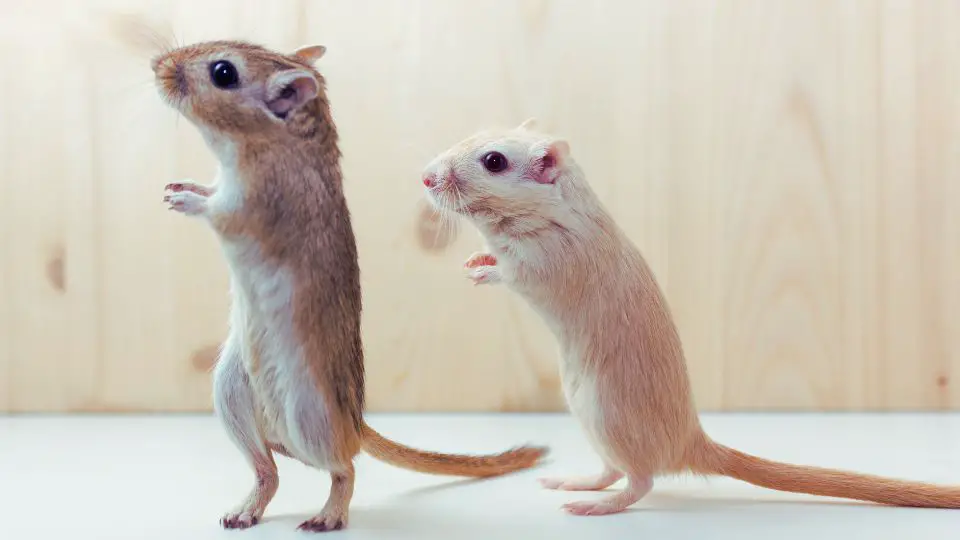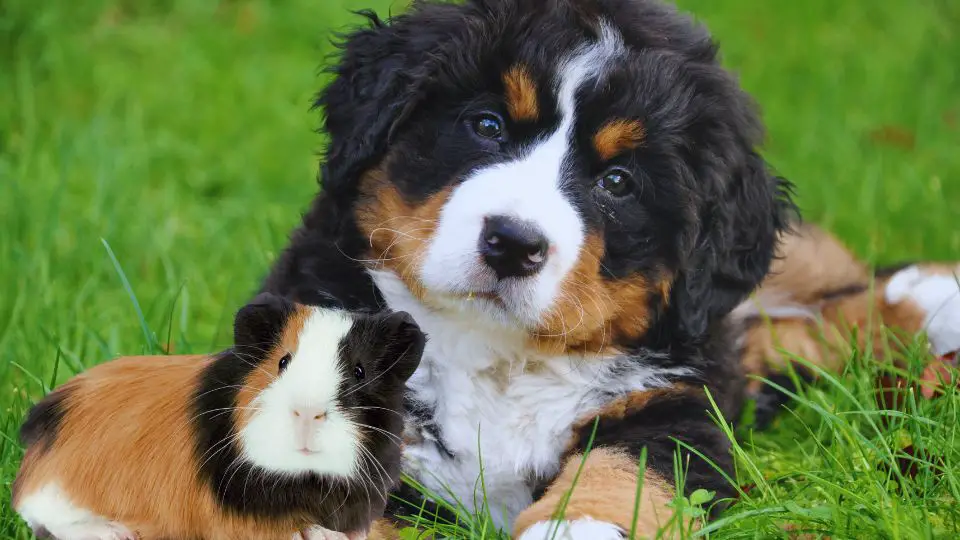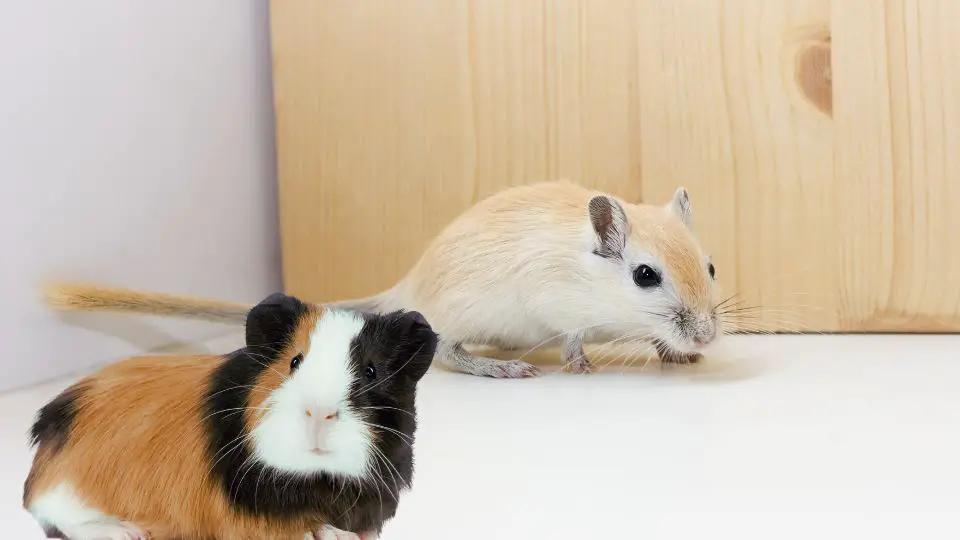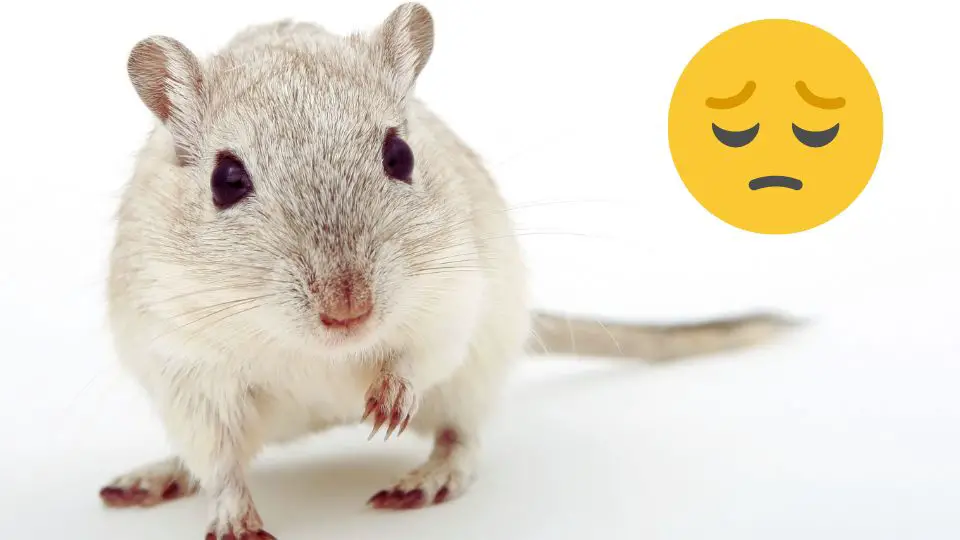Gerbils are known for their charming and affectionate nature, and one of the endearing behaviors they display is mutual grooming. Have you ever wondered why gerbils groom each other?
Gerbils groom each other as a way to bond, show affection, and maintain cleanliness within their group.
In this article, we’ll delve into the fascinating world of gerbil grooming and explore the reasons behind this adorable behavior.
Do gerbils groom each other?
Yes, gerbils do groom each other. Grooming is a common behavior among gerbils and serves several purposes. It helps them establish and maintain social bonds within their group, reinforces hierarchy and reduces conflict, and promotes hygiene by keeping their fur clean and free from dirt, parasites, and excess oils.
Grooming also serves as a form of communication and scent marking, helping gerbils establish territory and group identity. Additionally, gerbils may engage in mutual grooming as a way of providing care and assistance to their group members.
Overall, grooming behavior is an important aspect of gerbil social interactions and contributes to their overall well-being.
Bonding and Social Interaction
Grooming serves as a vital means of communication, establishing hierarchy, and reducing conflicts within the group. Let’s explore how grooming reinforces social bonds and contributes to the overall well-being of gerbils.
Reinforcing Social Bonds
Grooming is an intimate behavior that promotes trust and closeness among gerbils. When gerbils groom each other, they engage in reciprocal behavior, taking turns cleaning and preening each other’s fur. This mutual grooming strengthens their social bonds and fosters a sense of security and belonging within the group. It helps gerbils establish familiarity, build trust, and create a cohesive social unit.
Establishing Hierarchy
Grooming also plays a role in establishing and reinforcing the hierarchy within a gerbil group. Gerbils have a natural instinct to groom those higher in rank, and the higher-ranking gerbils often receive more grooming attention from their subordinates.
This grooming behavior serves as a form of respect and submission, emphasizing the social structure and reducing conflicts within the group. Through grooming, gerbils establish clear roles and maintain a harmonious social order.
Note that grooming behavior may vary among gerbils based on their individual personalities and social dynamics within the group. Some gerbils may be more active groomers, while others may be passive recipients of grooming. It is a natural behavior that reinforces social bonds and contributes to a harmonious gerbil community.
Hygiene and Cleanliness
Grooming is an instinctive behavior for gerbils, and it plays a crucial role in keeping their fur in tip-top condition. These little grooming gurus use their tiny paws and teeth to meticulously clean themselves. However, as responsible pet owners, we can lend a helping hand to ensure their grooming efforts are complemented and enhanced.
Removing Dirt
Gerbils are curious critters who love to explore their surroundings, which can sometimes lead to their fur getting dirty. Grooming helps in getting rid of dirt particles that may find their way into your gerbil’s coat. By actively grooming, your gerbil can clean off the dirt, preventing it from accumulating and potentially causing skin irritations or infections.
Banishing Parasites
Parasites can be pesky intruders in your gerbil’s fur, causing discomfort and health issues. Regular grooming sessions provide an excellent opportunity to spot and remove any unwelcome hitchhikers. Fleas, ticks, mites, and other parasites can be detected early on and promptly dealt with, ensuring your gerbil remains parasite-free and happy.
Bid Adieu to Excess Oils
Gerbils have sebaceous glands in their skin that produce natural oils to keep their fur moisturized. However, an excess build-up of these oils can make your gerbil’s fur appear greasy and dull. Grooming helps to distribute these oils evenly along the fur, preventing the coat from becoming overly oily and maintaining its natural shine.
Stress Reduction and Relaxation
Grooming is not only about keeping fur clean but also about maintaining mental well-being for gerbils. It’s a natural behavior deeply rooted in their instincts, and it has remarkable stress-reducing properties. Just like humans find comfort in activities that help them relax, gerbils benefit greatly from grooming sessions.
When gerbils groom themselves or engage in mutual grooming with their cage mates, it triggers a soothing and calming effect. The repetitive motion of cleaning their fur, coupled with the gentle touch, has a relaxing influence on their nervous system. It helps them unwind and enter a state of tranquility, similar to how a massage or spa treatment can relax us.
How to Promote Relaxation Through Grooming
- Provide a Peaceful Setting: Set up a calm and quiet space where your gerbils can engage in grooming without distractions. Create an atmosphere conducive to relaxation by reducing noise and ensuring a comfortable temperature.
- Encourage Social Interactions: If you have multiple gerbils, ensure they have enough opportunities for mutual grooming. Provide plenty of hiding spots, cozy nests, and toys to encourage social interactions and bonding.
- Time for One-on-One: Spend quality time with your gerbil by engaging in gentle grooming sessions. Use your fingers to imitate the grooming motions they would do naturally. Be patient, and let your gerbil guide the pace of the session.
- Environment Enrichment: Incorporate enrichment activities in your gerbils’ habitat, such as tunnels, chew toys, and foraging opportunities. These activities not only keep them mentally stimulated but also help to alleviate stress and promote overall well-being.
Communication and Scent Marking
Gerbils are highly social animals, and grooming is not only about maintaining hygiene but also about conveying information. Through grooming, gerbils establish and reinforce social bonds, express affection, and engage in subtle communication that goes beyond the surface-level act of cleaning.
Expressing Affection and Bonding
When gerbils groom each other, it’s a way of showing affection and strengthening their social connections. The gentle touch, grooming motions, and mutual exchange of scents create a positive and reassuring environment, fostering trust and camaraderie within the group. It’s their way of saying, “You’re part of our family.”
Showing Who’s in Charge
Grooming also helps gerbils establish a social order. The more dominant gerbils often start grooming sessions with their subordinates. It’s a way of saying, “I’m the boss here!” Grooming reinforces the group’s structure and keeps everyone happy.
The Power of Scent
During grooming, gerbils use scent marking to communicate silently. They have special glands that produce scents on their bellies, cheeks, and chins. These scents carry important messages about identity, territory, and more.
Claiming Territory
Gerbils use scent marking during grooming to mark their turf. When they rub their scent glands on objects or other gerbils, they leave behind their unique scent. It’s like saying, “This is my space!” This helps prevent conflicts and keeps gerbils feeling safe.
Recognizing Each Other
Scent marking during grooming helps gerbils recognize each other and strengthen their group identity. Each gerbil has a unique smell, and by sharing scents during grooming, they create a unified scent that says, “We’re all in this together!” It helps them tell friends from strangers.
Mutual Care and Assistance
Grooming is also an act of care and support among gerbils. They engage in mutual grooming, where they take turns cleaning each other’s fur. This behavior strengthens their social bonds and promotes a sense of togetherness within the group.
Gerbils display extraordinary compassion when it comes to grooming injured or ill group members. They instinctively recognize when a fellow gerbil is in need of extra care and assistance. In these instances, healthy gerbils willingly devote their grooming efforts to help their companions, promoting healing and overall well-being.
Grooming wounded or sick gerbils has a soothing effect, providing comfort and pain relief. The gentle touch and careful grooming motions help alleviate discomfort and promote relaxation. It’s like a comforting hug that says, “I’m here for you.”
The Power of Empathy
Gerbils’ ability to empathize with their group members is truly remarkable. Even without the ability to communicate through words, they understand when their companions need extra care and attention. Their mutual grooming serves as a testament to their empathy and willingness to support each other.
Is My Gerbil Over-Grooming?
Are you concerned that your gerbil may be over-grooming? While grooming is a natural behavior for gerbils, excessive grooming can sometimes be a sign of underlying issues. Here are some signs to look out for to determine if your gerbil is over-grooming:
- Bald Spots or Patchy Fur: If you notice areas where your gerbil’s fur is thinning or missing, it could indicate excessive grooming. Pay attention to the frequency and intensity of grooming in these areas.
- Red or Irritated Skin: Over-grooming can lead to skin irritation and redness. Check your gerbil’s skin for any signs of inflammation or discomfort.
- Scratching or Biting: If your gerbil is constantly scratching or biting at their fur, it could be a sign of over-grooming. Monitor their behavior to see if they seem overly focused on grooming activities.
- Neglecting Other Activities: Gerbils typically have a balance between grooming, exploring, and other activities. If your gerbil spends an excessive amount of time grooming and ignores other important behaviors, it may be a cause for concern.
If you suspect that your gerbil is over-grooming, it’s essential to identify the underlying cause. Excessive grooming can be triggered by factors such as stress, boredom, skin irritation, or even parasites. Here’s what you can do:
- Observe and Monitor: Keep a close eye on your gerbil’s grooming behavior to determine if it exceeds what is considered normal. Take note of any changes or patterns you observe.
- Check for Skin Issues: Carefully examine your gerbil’s skin for any signs of redness, sores, or parasites. If you notice any abnormalities, it’s best to consult a veterinarian for a thorough examination.
- Environmental Enrichment: Ensure your gerbil has a stimulating and enriching environment. Provide plenty of toys, tunnels, and opportunities for physical and mental exercise to prevent boredom.
- Minimize Stress: Gerbils are sensitive to their surroundings, so create a calm and peaceful environment for them. Avoid loud noises, sudden changes, or any other factors that may cause stress.
- Veterinary Consultation: If you’re concerned about your gerbil’s grooming behavior, it’s always a good idea to consult a veterinarian who specializes in small animals. They can conduct a thorough examination and provide guidance tailored to your gerbil’s specific needs.
Why Is My Gerbil Grooming Me?
If you’ve noticed that your gerbil is grooming you, it’s actually quite a sweet behavior and a sign of affection. Gerbils are social animals and they use grooming as a way to bond with their companions, which can include their human caregivers.
Here are a few reasons why your gerbil may be grooming you:
- Mutual Bonding: Grooming is a way for gerbils to strengthen social bonds and show affection. By grooming you, your gerbil is treating you as part of their social group and expressing their fondness for you.
- Mimicking Natural Behavior: Gerbils have an instinctual drive to groom themselves and their companions. When they groom you, they may be imitating the behavior they would normally display towards their fellow gerbils.
- Reciprocity: Gerbils may also groom you as a way of reciprocating the grooming they receive from you. If you’ve been gentle and caring towards your gerbil during their grooming sessions, they may see it as an opportunity to return the favor.
- Marking Territory: Grooming can also involve scent marking, where gerbils leave their scent on the individuals they groom. By grooming you, your gerbil may be claiming you as part of their territory and marking you as a member of their social group.
FAQ
Why Are My Gerbils Squeaking While Grooming?
Squeaking during grooming is usually a sign of contentment and pleasure. It indicates that your gerbils are enjoying the grooming process and are expressing their happiness. It’s a positive behavior and nothing to be concerned about.
What Causes Barbering in Gerbils?
Barbering is a behavior where a gerbil excessively chews or bites the fur of themselves or their cage mates. It can be caused by various factors such as stress, boredom, hierarchy issues, or underlying health conditions. If you notice barbering, it’s important to observe your gerbils closely and address any potential causes or consult a veterinarian for advice.
How do you know if gerbils are bonded?
Bonded gerbils typically display certain behaviors and interactions. Signs of bonding include grooming each other, cuddling, playing together, sharing food, and generally spending a lot of time in close proximity. They may also sleep huddled together or engage in synchronized movements. If your gerbils exhibit these behaviors, it’s a good indication that they are bonded.
Why do gerbils lick each other?
Gerbils lick each other as a form of grooming and social bonding. Licking helps to keep their fur clean, remove dirt, and maintain hygiene. It’s also a way for gerbils to show affection and reinforce their social bonds within the group. Licking is a positive behavior that promotes companionship and trust among gerbils.
Conclusion
In conclusion, the act of grooming holds great significance in the world of gerbils. It goes beyond mere hygiene maintenance, serving as a powerful tool for bonding, communication, and social cohesion within their groups. Whether it’s to establish trust, display affection, or keep each other clean, gerbils engage in mutual grooming as a way to nurture their social connections and strengthen the unity of their community.
As we observe their grooming rituals, let’s appreciate the beauty of these small but meaningful interactions and celebrate the extraordinary relationships that gerbils form through this adorable behavior.







